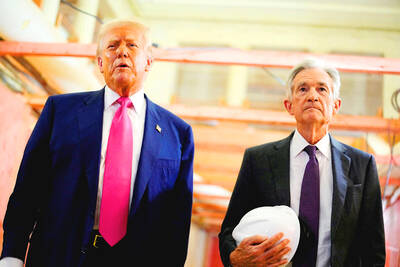State-run Taiwan Financial Holding Co (
Taiwan Financial will also become the largest megabank and conglomerate in Taiwan, overtaking Cathay Financial Holding Co (
Speaking at a ceremony ahead of the megabank's launch yesterday, Premier Chang Chun-hsiung (
Chang called the creation of Taiwan Financial a success in the face of "an impossible mission."
He said that Taiwan Financial would become the lender with the biggest market share in Taiwan -- 18 percent -- with NT$3.88 trillion in deposit savings and NT$3.24 trillion in corporate lending.
"Taiwan Financial will be an important force in the government's efforts to pursue financial market stability," Chang said.
Taiwan Financial chairman Tsai Jer-shyong (蔡哲雄) yesterday vowed to improve the megabank's international competitiveness "by boosting its capital efficiency, reducing costs and creating synergies through cross-selling" at 323 outlets under five subsidiaries -- including a planned securities company and life insurance company.
Tsai said Taiwan Financial's spectrum of talent and outlets put it in an excellent position to serve corporate clients with operations across Asia.
Tsai said that the bank sees the Chinese market as part of its global clientele base and hoped to enter Chinese markets if government restrictions are lifted.
Taiwan Financial will also seek strategic partnerships with foreign financial service providers to expand its product lines and services to cash in on the booming wealth management business.
Although he declined to reveal the lender's profit goal for next year, Tsai expressed confidence in Taiwan Financial's prospects, saying "the bank's income from first-year insurance premiums are expected to reach NT$20 billion by the year's end."
Taiwan Financial also elected 12 board members yesterday, including two representatives from the Bank of Taiwan, one from Land Bank, one from the Export-Import Bank, one independent director and seven other professionals.
The megabank has no plan to privatize in the near future, Tsai said.
"It's the government's call," he said.

IN THE AIR: While most companies said they were committed to North American operations, some added that production and costs would depend on the outcome of a US trade probe Leading local contract electronics makers Wistron Corp (緯創), Quanta Computer Inc (廣達), Inventec Corp (英業達) and Compal Electronics Inc (仁寶) are to maintain their North American expansion plans, despite Washington’s 20 percent tariff on Taiwanese goods. Wistron said it has long maintained a presence in the US, while distributing production across Taiwan, North America, Southeast Asia and Europe. The company is in talks with customers to align capacity with their site preferences, a company official told the Taipei Times by telephone on Friday. The company is still in talks with clients over who would bear the tariff costs, with the outcome pending further

NEGOTIATIONS: Semiconductors play an outsized role in Taiwan’s industrial and economic development and are a major driver of the Taiwan-US trade imbalance With US President Donald Trump threatening to impose tariffs on semiconductors, Taiwan is expected to face a significant challenge, as information and communications technology (ICT) products account for more than 70 percent of its exports to the US, Chung-Hua Institution for Economic Research (CIER, 中華經濟研究院) president Lien Hsien-ming (連賢明) said on Friday. Compared with other countries, semiconductors play a disproportionately large role in Taiwan’s industrial and economic development, Lien said. As the sixth-largest contributor to the US trade deficit, Taiwan recorded a US$73.9 billion trade surplus with the US last year — up from US$47.8 billion in 2023 — driven by strong

AI: Softbank’s stake increases in Nvidia and TSMC reflect Masayoshi Son’s effort to gain a foothold in key nodes of the AI value chain, from chip design to data infrastructure Softbank Group Corp is building up stakes in Nvidia Corp and Taiwan Semiconductor Manufacturing Co (TSMC, 台積電), the latest reflection of founder Masayoshi Son’s focus on the tools and hardware underpinning artificial intelligence (AI). The Japanese technology investor raised its stake in Nvidia to about US$3 billion by the end of March, up from US$1 billion in the prior quarter, regulatory filings showed. It bought about US$330 million worth of TSMC shares and US$170 million in Oracle Corp, they showed. Softbank’s signature Vision Fund has also monetized almost US$2 billion of public and private assets in the first half of this year,

POWELL SUCCESSOR: US Fed Governor Adriana Kugler’s resignation gives Donald Trump an opening on the board, potentially accelerating his decision on the next chair US President Donald Trump suddenly has a chance to fill an opening at the US Federal Reserve earlier than expected, after Fed Governor Adriana Kugler announced her resignation on Friday. It might also force him to pick the next Fed chair months sooner than he had anticipated. “The ball is now in Trump’s court,” LH Meyer/Monetary Policy Analytics Inc economist Derek Tang said. “Trump is the one who’s been putting pressure on the Fed to do this and that, and Trump says he wants to have his own people on. So now he has the opportunity.” Kugler’s exit unfolds amid unprecedented public pressure